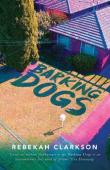
Latest Issues
AbstractHistoryArchive Description
Everybody thinks they know this story. But do they really?
If you took a bird’s-eye view of Mount Barker, you’d see ordinary Australians living on their ordinary suburban blocks in an ordinary regional town. Get closer. Peer through a window. You might see Nathan Long, obsessively recording the incessant bark of a neighbourhood dog, or the Wheeler family sitting down for a meal and trying to come to terms with a shocking discovery. If you listen, you may hear tales of fathers and their wayward sons, of widows who can’t forgive themselves, of children longed for and lost, of thwarted lust and of pure, incorruptible love. Within the shadows is an unspeakable crime.
Rebekah Clarkson has created a compelling, slow-burning portrait of a town in the midst of major change as it makes the painful transformation from rural idyll to aspirational suburbia. What looked like redemption is now profound loss. What seemed spiteful can now be forgiven
(Publication Summary)
Publication Details of Only Known VersionEarliest 2 Known Versions of
Other Formats
- Also dyslexic edition
Works about this Work
-
Stories for Hyperlinked Times : The Short Story Cycle and Rebekah Clarkson’s Barking Dogs
2019
single work
column
— Appears in: The Conversation , 9 October 2019;'We live hyperlinked lives, expected to be switched on and logged in 24 hours a day, seven days a week. Time is a dwindling resource, multitasking is our default setting. We’re constantly reading: online articles, emails, social media posts. But for many of us, this dip-in, dip-out reading feels dissatisfying. We crave deeper engagement.' (Introduction)
-
What I’m Reading
2017
single work
column
— Appears in: Meanjin Online 2017; -
Desert, Picket Fences Both Become a Kind of Prison
2017
single work
essay
— Appears in: The Weekend Australian , 18 March 2017; (p. 20) 'A strong sense of place is a vital characteristic of our national literary imagination. Whether it’s the outback, the bush, the beach or the city, place frames and shapes the stories we tell. It is something darker in two interesting Australian novels, Cassandra Austin’s All Fall Down and Rebekah Clarkson’s debut Barking Dogs. Here place is a stultifying prison, an antagonist to overcome.' (Introduction) -
'Barking Dogs' by Rebekah Clarkson
2017
single work
criticism
— Appears in: Australian Book Review , March no. 389 2017; (p. 52) ‘Mount Barker, its surrounding environs and proliferating estates, might be situated in volcanic territory for all the ferocious eruptions of violence that occur in Rebekah Clarkson’s collection of stories, Barking Dogs. The demographic is noticeably white Australian. In ‘Dancing on Your Bones’, a loathsome consultant suggests the government develop the Summit – a sacred site – in response to a native title claim and name it ‘Peramangk Estate’. The physical absence of other ethnicities is stark throughout Clarkson’s book; even the Summit itself seems invisible to those living at its base.’ (Introduction)
-
'Barking Dogs' by Rebekah Clarkson
2017
single work
criticism
— Appears in: Australian Book Review , March no. 389 2017; (p. 52) ‘Mount Barker, its surrounding environs and proliferating estates, might be situated in volcanic territory for all the ferocious eruptions of violence that occur in Rebekah Clarkson’s collection of stories, Barking Dogs. The demographic is noticeably white Australian. In ‘Dancing on Your Bones’, a loathsome consultant suggests the government develop the Summit – a sacred site – in response to a native title claim and name it ‘Peramangk Estate’. The physical absence of other ethnicities is stark throughout Clarkson’s book; even the Summit itself seems invisible to those living at its base.’ (Introduction) -
Desert, Picket Fences Both Become a Kind of Prison
2017
single work
essay
— Appears in: The Weekend Australian , 18 March 2017; (p. 20) 'A strong sense of place is a vital characteristic of our national literary imagination. Whether it’s the outback, the bush, the beach or the city, place frames and shapes the stories we tell. It is something darker in two interesting Australian novels, Cassandra Austin’s All Fall Down and Rebekah Clarkson’s debut Barking Dogs. Here place is a stultifying prison, an antagonist to overcome.' (Introduction) -
Stories for Hyperlinked Times : The Short Story Cycle and Rebekah Clarkson’s Barking Dogs
2019
single work
column
— Appears in: The Conversation , 9 October 2019;'We live hyperlinked lives, expected to be switched on and logged in 24 hours a day, seven days a week. Time is a dwindling resource, multitasking is our default setting. We’re constantly reading: online articles, emails, social media posts. But for many of us, this dip-in, dip-out reading feels dissatisfying. We crave deeper engagement.' (Introduction)
-
What I’m Reading
2017
single work
column
— Appears in: Meanjin Online 2017;



